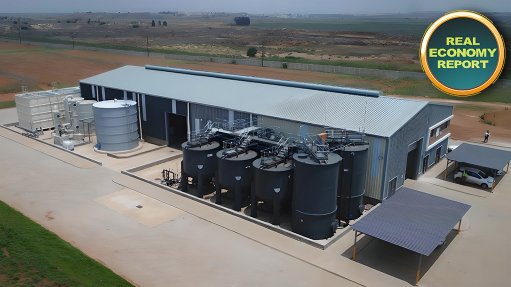FATF greylisting provides impetus to get South Africa's commercial crime-fighting system up to scratch – BLSA
The work being done to reduce the chance that South Africa will be greylisted by global anti-money laundering and terrorist financing body the Financial Action Task Force (FATF) provides more impetus for South Africa to get its commercial crime-fighting system up to scratch, says business body Business Leadership South Africa (BLSA) CEO Busi Mavuso.
The National Prosecuting Authority (NPA) has worked hard to rack up the number of cases related to State capture and institutions ranging from the South African Revenue Service to the Financial Intelligence Centre have been working to implement new measures to combat money laundering, she points out.
“The question that business needs to know, though, is whether it will be enough to convince the FATF,” she notes.
The FATF aims to support countries to meet its recommendations and expectations for the effectiveness of supervision, investigation and prosecution related to money laundering and terrorist financing. This is closely allied to the interest of business in seeing effective policing, investigation and justice for commercial crime.
“It is for this reason that BLSA has signed a memorandum of understanding to support the NPA to access skills in the private sector needed for investigations and to develop cases. The stakes are high. Apart from FATF greylisting, crime poses serious risks to our economy and country as a whole.
“A report by the Global Initiative Against Organised Crime in September said surging rates of murder, extortion and kidnapping pose an existential threat to South Africa,” Mavuso says.
Greylisting is largely a consequence of the collapse of commercial crime investigation and prosecution during the State capture era. South Africa is facing the consequences for its inability to mount effective prosecutions for crimes like money laundering and terrorist financing, she emphasises.
Greylisting has potentially serious implications for the economy, increasing the cost of financial transactions with the rest of the world. It will make it harder to do business for anyone operating financial accounts abroad or dependent on foreign financial services providers.
“The implications for our integration into the international economy are clear. Some have compared greylisting to the loss of an investment-grade credit rating. There are similarities, as counterparts all adjust their views of the risk of doing business with South Africa; however, greylisting will be a reputational risk, whereas a downgrade shifts perceptions of credit risk,” she adds.
BLSA has commissioned research to answer this question that we will be launching with members and the rest of organised business on October 11. The research will analyse the likely economic consequences of greylisting and how to mitigate these.
Those consequences will depend in large part on how confident the world is that greylisting is a temporary phenomenon, one that will be ended swiftly as we move to establish effective institutions that successfully detect and, ultimately, eliminate money laundering, Mavuso says.
“There are important implications for businesses. They need to understand the consequences of grey listing and how to mitigate them. However, there is a clear role for business to play in a national effort to deal with organised crime, which is connected to money laundering and terrorist finance.
“That national effort is going to need to tap on the skills that the private sector has in forensic investigation and evidence gathering. Apart from our engagement with the NPA, our subsidiary Business Against Crime works widely to support the criminal justice system,” she states.
“The FATF process provides more impetus for us to get our commercial crime-fighting system up to scratch.”
The extent of corruption in any country is almost always inversely proportionate to the strength of the institutions set up to prevent it. If people think they can get away with it, there is a higher chance they will steal. The weaker a country’s watchdog institutions, the higher the levels of corruption, Mavuso notes.
Comments
Press Office
Announcements
What's On
Subscribe to improve your user experience...
Option 1 (equivalent of R125 a month):
Receive a weekly copy of Creamer Media's Engineering News & Mining Weekly magazine
(print copy for those in South Africa and e-magazine for those outside of South Africa)
Receive daily email newsletters
Access to full search results
Access archive of magazine back copies
Access to Projects in Progress
Access to ONE Research Report of your choice in PDF format
Option 2 (equivalent of R375 a month):
All benefits from Option 1
PLUS
Access to Creamer Media's Research Channel Africa for ALL Research Reports, in PDF format, on various industrial and mining sectors
including Electricity; Water; Energy Transition; Hydrogen; Roads, Rail and Ports; Coal; Gold; Platinum; Battery Metals; etc.
Already a subscriber?
Forgotten your password?
Receive weekly copy of Creamer Media's Engineering News & Mining Weekly magazine (print copy for those in South Africa and e-magazine for those outside of South Africa)
➕
Recieve daily email newsletters
➕
Access to full search results
➕
Access archive of magazine back copies
➕
Access to Projects in Progress
➕
Access to ONE Research Report of your choice in PDF format
RESEARCH CHANNEL AFRICA
R4500 (equivalent of R375 a month)
SUBSCRIBEAll benefits from Option 1
➕
Access to Creamer Media's Research Channel Africa for ALL Research Reports on various industrial and mining sectors, in PDF format, including on:
Electricity
➕
Water
➕
Energy Transition
➕
Hydrogen
➕
Roads, Rail and Ports
➕
Coal
➕
Gold
➕
Platinum
➕
Battery Metals
➕
etc.
Receive all benefits from Option 1 or Option 2 delivered to numerous people at your company
➕
Multiple User names and Passwords for simultaneous log-ins
➕
Intranet integration access to all in your organisation

















